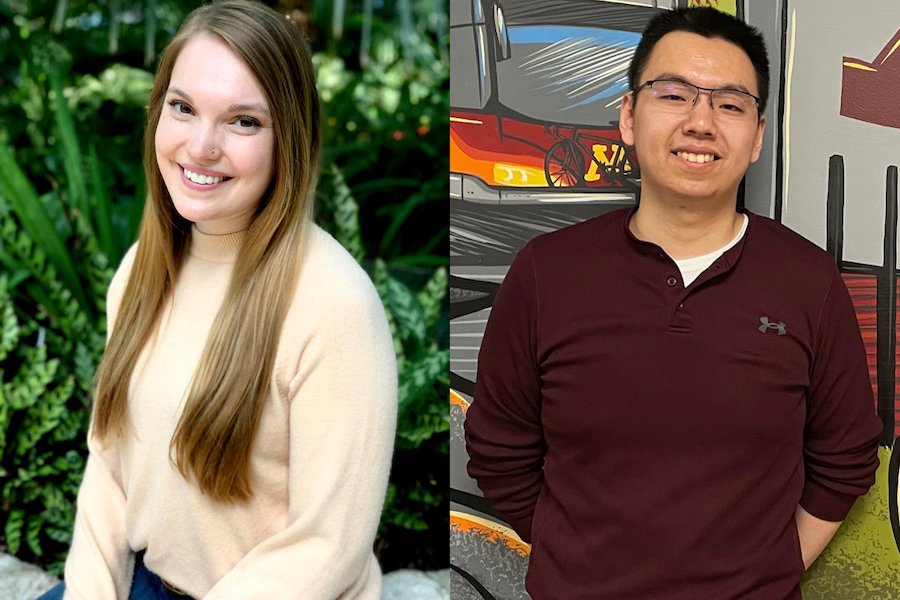Recent grads excel as CSE Mentor Program reaches highest number of industry mentors in nine years

Longtime college program doesn’t just benefit students, but mentors as well
Feb. 14, 2023
If Kimberly Colgan has discovered anything in her four years of participating in the College of Science and Engineering (CSE) Mentor Program, it’s that even as a teacher, you never stop learning.
“My favorite thing about mentoring is that you really learn as much or more from your students as they probably learn from you,” said Colgan, who is in her fifth year as a mentor and holds two University of Minnesota degrees—bioproducts and biosystems engineering (Ph.D. '22) and industrial and systems engineering (B.S. '17). “I’ve learned about scientific research my students are doing that I didn’t even know existed. One of my students is very artistic, so I’ve been learning ways that you can incorporate skills from an engineering degree into the arts. It’s all been a really cool area to explore.”
Every year, the CSE Mentor Program pairs more than 200 sophomore, junior, and senior science and engineering students with industry professionals who can provide insight about potential careers, research experience, and university resources, among many other things.
The program dates back to the 1990s, but as many of its mentors would agree, it hasn’t lost any of its steam.
In the 2022-23 academic year, the program reached the highest number of industry participants—224—in nearly a decade.
Pass on what you have learned
While not all mentors graduated from the University of Minnesota, most are CSE alumni.
“I was helped by so many people along the way in school, and I just want to do the same thing for others,” said Jinbin Chen, a 2020 graduate with degrees in chemical engineering and chemistry who now works as a product engineer for 3M. “It’s nice that I can do this right now even as someone who just graduated. Now that I’ve done all the hard work to get a job, I can now help students who are just like me to do the same.”
According to Chen, one of the best parts about being a recent CSE alumnus in the mentor program is that he feels more connected to what the students are currently going through. He and his current mentee, who is also pursuing a degree in chemical engineering, meet regularly to talk about everything from how to format a resume to which electives are the most important to take.
“The student I’m mentoring now is a sophomore, and sophomore year wasn’t too long ago for me,” said Chen, who received the Chemical Engineering and Materials Science Alumni Scholarship as an undergraduate student.
“I can still answer questions about classes because it wasn’t too long ago that I had to take those same classes. Being relatable to their coursework and understanding where they’re at is a big plus.”
Chen is a former mentee himself. He signed up for the mentor program as a sophomore in his undergraduate years, and the experience he gained ended up guiding him along his career path.
“No one in my immediate family works in engineering, so I wanted to get some perspective from industry professionals,” he said. “My first mentor was a water resources engineer, and after that I actually did some work related to water treatment. My second mentor was a food engineer and interestingly enough, the first job I had out of college was working at a food plant. From talking to both of them, I was able to get my foot in the door and learn about the skills I needed to work in those settings.”
Give back to the next generation
Colgan wanted to give younger students a broader, more unconventional career perspective. Her path diverged from studying operations and systems to researching ways to mitigate greenhouse gas emissions in our global food systems as a Ph.D. student under BBE professor Jason Hill.
“As a grad student, I did an internship with the United States Agency for International Development where I used a lot of my data and engineering skills,” Colgan explained. “I had no idea that that government agency existed until I applied for that internship.”
“One thing I really wanted to do was make sure students are aware of and can find resources for jobs where you use your engineering skills in ways that are perhaps less traditional but still make a difference.”
Colgan now lives in Seattle, Wash., and just started a job as a greenhouse gas engineer for the Washington State Department of Ecology. She checks in with her current mentee over Zoom, and she still keeps in contact with all of her former students.
Recently, the first student she ever mentored reached out to her. She learned that because of the conversations they had about working in science policy, he had decided to pursue it as a career and is now working for the Secretaría Nacional de Energía, or the Department of Energy, in Panama.
“He said that some of the things I told him really resonated with him,” Colgan explained. “I guess I had more of an impact than I thought I did because now he’s working with his engineering skills in the policy field. It was really exciting to see my words have such a positive impact. It’s really fulfilling.”
Story by Olivia Hultgren
If you’d like to support students and programs in the University of Minnesota College of Science and Engineering, visit our CSE Giving website.
